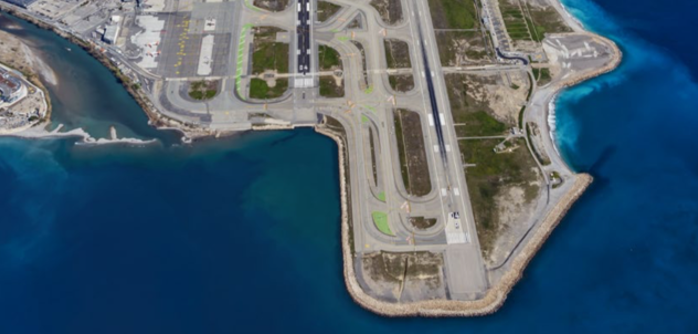Nice Côte d’Azur Airport in France ended 2021 with Level 4+ Airport Carbon Accreditation and a traffic total of 6.54 million passengers – despite stringent health measures and travel restrictions – as a result of the return of long-haul flights from the summer season onward.
After the first year of the pandemic, the airport welcomed 6.54 million passengers in commercial traffic, a recovery rate of 45% compared with 2019’s reference. Comparatively, business aviation regained its pre-pandemic levels in the three Côte d’Azur airports. Nice Côte d’Azur saw 37,000 business aviation passengers, Cannes-Mandelieu 13,000 and Golfe de Saint-Tropez 3,700.
This average growth masked the disparity between the first semester, which was greatly affected by the lockdown measures and only saw an average recovery rate of 23%, and the second semester, which was much more positive and saw an average recovery rate of 64% compared with 2019. Though the traffic is still largely focused on domestic routes (69% recovery rate) and Schengen routes (39.8%), international traffic has had a proactive return, with close to a quarter of traffic returning, primarily concentrated in the second semester.
Nice Côte d’Azur gained the Level 4+ Airport Carbon Accreditation by reducing its greenhouse gas emissions by 4.4%, quantifying its semi-cruising aircraft emissions and integrating this volume into its reduction and compensation plan. The airport also committed to absorbing CO2 with plant-based carbon sinks near its terminals. It also has laid plans to remove the gas heating in Terminal 1 and replace it with a temperature water loop in autumn 2021. The energy stems of this project will come from the Métropole Nice Côte d’Azur’s wastewater network and represent 700 tons of CO2 saved per year. In September 2021, an Air France scheduled commercial flight connecting Nice and Paris took to the air with 30% biofuel or sustainable aviation fuel (SAF).
Finally, Urban Blue has designed and implemented the necessary infrastructure for developing e-VTOLs – electric drones that can transport passengers without energy from fossil fuels. The seafront location of the Nice Côte d’Azur and Cannes-Mandelieu airports helped with the experimental phases, as did the saturation of the region’s ground infrastructure, warranting the emergence of a complementary transport offer.
Franck Goldnadel, chairman of the board of Aéroports de la Côte d’Azur, said, “This recovery of passenger traffic, and more specifically of long-haul flights, attests to how attractive our region is, and to the airlines’ and passengers’ confidence in the health safety measures that have been implemented. It allows us to be optimistic for the year to come, as we already have a large number of destinations – particularly transatlantic ones – in our provisional flight program for the 2022 summer season.
“Receiving the Level 4+ Airport Carbon Accreditation isn’t a greenwashing operation. It represents the factual and international recognition of a sincere commitment and an ambitious and unprecedented action plan. When we reduce the absolute value of our direct emissions, we help to protect our region. This involves taking numerous actions, being innovative and looking for solutions that help to reconcile air transport with air quality requirements on a daily basis. In the future, low-emission airplanes will take off and land on totally neutral airports. This is the course of history, and we want to be the leading laboratory in this field.
“The electric plane is suited to this kind of structure and we are going to do all we can for its popularization, through the reduction of airport fees and grants covering the purchase. The electric plane means zero emissions and reduced noise in flight. We owe it to our region.”


